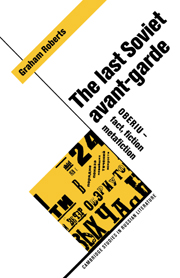Book contents
- Frontmatter
- Contents
- Acknowledgements
- Notes on transliteration and conventions
- Introduction: OBERIU – the last Soviet avant-garde
- 1 Authors and authority
- 2 Rereading reading
- 3 Language and representation
- Conclusion: OBERIU – between modernism and postmodernism?
- Notes
- Bibliography
- Index
- CAMBRIDGE STUDIES IN RUSSIAN LITERATURE
Introduction: OBERIU – the last Soviet avant-garde
Published online by Cambridge University Press: 02 September 2009
- Frontmatter
- Contents
- Acknowledgements
- Notes on transliteration and conventions
- Introduction: OBERIU – the last Soviet avant-garde
- 1 Authors and authority
- 2 Rereading reading
- 3 Language and representation
- Conclusion: OBERIU – between modernism and postmodernism?
- Notes
- Bibliography
- Index
- CAMBRIDGE STUDIES IN RUSSIAN LITERATURE
Summary
OBERIU (an abbreviated form of ‘Ob″ edinenie real′nogo iskusstva′, meaning ‘The Association for Real Art’), was the last, certainly the most outlandish, and arguably the most important, manifestation of the Soviet literary avant-garde of the late 1920s. This loose association of Leningrad writers, founded by Daniil Kharms, Aleksandr Vvedensky, Nikolay Zabolotsky, Igor′ Bakhterev, and Konstantin Vaginov, lasted, in various forms and under a variety of names from 1926 to 1930. During this relatively short time they achieved a good deal of notoriety, not least for their eccentric behaviour and their generally riotous public performances. Their refusal to conform to accepted notions of good taste earned these writers the opprobrium of the Soviet press, which branded them all manner of things, from ‘Dadaists’ to ‘the class enemy’. The group was soon forced to curtail its activities, its individual members seemingly reduced to silence, thereby signalling what one critic has described as ‘the end of Russian futurism’. As we shall see, however, not only did they keep on writing, but the significance of what they produced extends way beyond their own time and space.
What makes OBERIU interesting today? One might begin to answer that question by pointing out that the group was part of the general experimental wave which crashed against the rocks of European literature and the arts in the 1920s and 1930s.
- Type
- Chapter
- Information
- The Last Soviet Avant-GardeOBERIU - Fact, Fiction, Metafiction, pp. 1 - 21Publisher: Cambridge University PressPrint publication year: 1997

